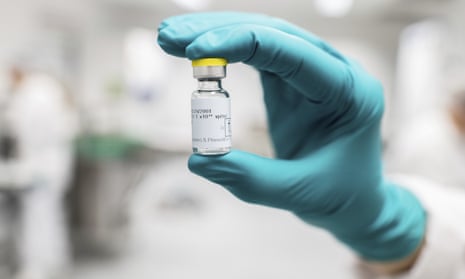Johnson & Johnson has asked US regulators to approve the world’s first single-dose Covid-19 vaccine, an easier-to-use option that could boost scarce supplies.
The drugmaker’s application to the US Food and Drug Administration (FDA) follows its 29 January report in which it said the vaccine had a 66% rate of preventing infections in its large global trial.
J&J’s single-shot vaccine could increase supply and simplify the US immunization campaign, amid concerns of fresh surges due to the more contagious UK coronavirus variant and the potential of lower vaccine efficacy against the variant that first emerged in South Africa.
The company also said it will apply to European authorities for approval in coming weeks.
The Moderna and Pfizer vaccines, which are now being distributed in the US, are administered as two doses, and the Pfizer vaccine must be stored in ultra-cold storage. However, the J&J vaccine can be given in a single dose and stored in normal refrigerators, meaning it will be easier to distribute, especially in rural areas.
The company’s chief scientific officer, Paul Stoffels, said last month J&J was on track to roll out the vaccine in March.
“Upon authorization of our investigational Covid-19 vaccine for emergency use, we are ready to begin shipping,” Stoffels said in a statement announcing the application.
But the FDA is asking its independent advisers to publicly debate all the data behind the single-dose shot – just like its competitors were put under the microscope – before it decides whether to green-light a third vaccine option in the US.
J&J’s application raised hopes for fighting a pandemic that has claimed more than 451,145 American lives and over 2,271,152 worldwide.
About 8% of the US population has now received at least one dose of a coronavirus vaccine, the White House coronavirus response team said on Thursday, but fears remain the rollout is progressing too slowly. The Biden administration is on track to exceed the president’s goal of distributing 100m vaccine doses in his first 100 days in office, yet some health experts have suggested that Biden should set a more ambitious goal in order to get all Americans vaccinated as quickly as possible.
During a recent briefing, the top US health official Dr Anthony Fauci said the Johnson & Johnson’s vaccine trial results mean “we have now a value-added additional vaccine candidate”.
The United States has agreed to pay $1bn for 100m doses, which J&J said it expected to supply in the first half of the year. The United States also has the option of purchasing an additional 200m doses.
The company said it aims to deliver 1bn doses in 2021 with production in the United States, Europe, South Africa and India.
J&J’s vaccine uses a common cold virus known as adenovirus type 26 to introduce coronavirus proteins into cells in the body and trigger an immune response. The Pfizer/BioNTech and Moderna vaccines use a new technology called messenger RNA (mRNA) that requires it to be stored in a freezer.
